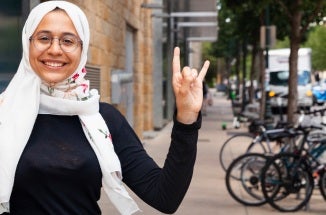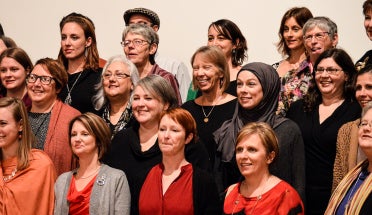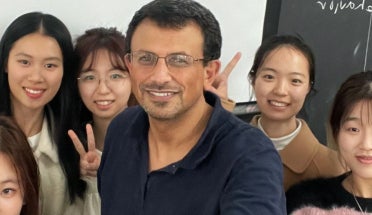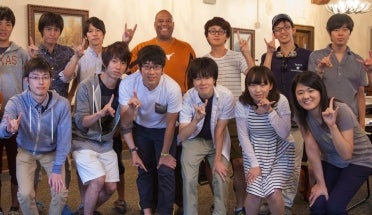
This Young Saudi Arabian Engineer is Inspiring Women in STEM
- Aug 27, 2019
- English Language Center
Renad Abualjamal is determined to inspire young women to cultivate their interest and talent in STEM. Thanks to her experience at UT Austin and the support of her peers, she is getting closer to this dream.
Abualjamal, a rising sophomore at Stanford University pursuing her Bachelor’s in Materials Science and Engineering, participated in a five-week summer research program at UT Austin as part of the KAUST Gifted Student Program, an academic and pre-professional scholarship administered by King Abdullah University of Science and Technology in Saudi Arabia. The scholarship supports Saudi Arabia’s most talented youth as they pursue STEM degrees at premier U.S. universities in preparation for future graduate studies back at KAUST.
With her time at UT Austin, Abualjamal traveled across the U.S. and gained new experiences as a student and emerging scholar. In addition to participating in professional development workshops and cultural excursions in Austin, the focus of Abualjamal’s experience was her work with Dr. Guihua Yu in the Cockrell School Department of Mechanical Engineering. Together with graduate research assistant Xuelin Guo, she explored new configurations for high-energy, high-power and dendrite-free hybrid-ion batteries—a focus in this global research field and a potential solution to satisfy demands for massive renewable energy storage.
In this Q&A, she shared her experiences as an international student and what drives her passion as a STEM major.
Why did you choose your major?
I think of engineering as the idea of building something out of nothing. This is fascinating since we take so many everyday things for granted. I love the idea of working on something that will later become a product and solving a problem from its roots.
I first remember thinking about this in chemistry. It was interesting to me that we use certain chemicals just because of the cost and convenience, but it does harm in the longer term. We need to find alternatives that do not cause harm to the environment. The process to figure that out is interesting to me. I am most passionate about the environment, solving global warming and finding plastic substitutes. My passion for the environment drives my interest in this field.
Why are you passionate about women in STEM?
Back home in Saudi Arabia, I was used to seeing girls at the top of the class. Since starting college, however, I’ve noticed a lack of women in STEM. It seems like an obvious problem and fix, but there are so many layers to it. Will they feel welcomed? Will they belong? Will they be more vulnerable to setbacks? It’s oblivious to say, “If girls want to be in STEM, then why not? No one is stopping them.”
But it’s a tricky topic because you don’t want to force diversity and make it into a checklist. The idea is making it comfortable for all parties to show up or not show up, and to have a more organic reaction to women who want to be in STEM. I want to be a part of improving the situation for women in STEM.
Why did you want be in the KAUST Gifted Student Program and earn your bachelor’s degree in the United States?
I wanted to join KGSP to become part of the amazing community it encompasses. I visited King Abdullah University of Science and Technology growing up, and had a lot of friends in KGSP. I also really appreciate having a dedicated KGSP advisor. It’s much easier having someone to ask and support you, rather than doing things on your own.
Deciding to come to the U.S. was a natural progression for me. I decided to study abroad when I was in the tenth grade and that was when I moved go to an international school in Jeddah and started taking classes in English. That was the hard part—knowing the materials I knew in a different language rather than Arabic. Since I was immersed with people that also wanted to study abroad, I didn’t really think much about what the university experience would be in Saudi Arabia. I was busy studying for SAT and applying to schools here.
What has it been like being an international student in the U.S.?
Amazing so far! The value of any institution is the connections and resources it has. That is unique to every college and it’s the institutions I have had the opportunity to go to that has been so valuable, more than the concept of going abroad itself. While studying abroad, I have found that problems, like lack of education and awareness on issues exist in every community to a certain degree—that’s something I didn’t expect. At Stanford, I find that I can express my opinions and have valuable and constructive conversations. Especially in comparison to high school, people in college argue less and are more willing to absorb information.
What has been your favorite part of your summer here in Austin?
I’m really enjoying Austin; it’s a vibrant place. Definitely different from California. It’s very hot. Lots of art, that’s something I really appreciate. I’ve been to a few museums like The Contemporary Austin and plan to go to more!
What has your research experience been like at UT Austin?
It has been an overall positive experience. I didn’t know how good the Mechanical Engineering department was until I got here. Now that I see where the research is from and who the faculty are, I know there’s a lot of significant research going on here, like the lithium-ion battery was patented here by Dr. John B. Goodenough.
I find there is female-male diversity here and I’m happy to work with Xuelin Guo because I can look up to her. As a female in STEM, I feel I don’t have many to look up to.
As a woman in STEM, who inspires you and where do you find inspiration?
I find inspiration in the young girls who grow up with big dreams. Just looking at them and hearing them talk with such passion about what they want to be when they grow up makes me want to work harder to be the role model that I didn’t have. Marie-Sophie Germain, the famous French mathematician, physicist and philosopher, is also an inspiration as she faced many struggles being a female in STEM. And you can see that up until now, she’s still underrepresented. She did many things, but she’s only known for a couple of things in mathematics. So, shout out to all the women succeeding despite those struggles, and I hope to make it one day.
What is something that you have learned from your fellow KGSP scholars, particularly your female peers?
I find that at my college, I’m friends with people not from Saudi. Therefore, our conversations are different versus my peers here at UT in the KGSP summer enrichment program. When I talk to my KGSP peers, it makes me understand the Saudi community better because our experiences are so different since we’re all from different parts of Saudi Arabia. We talk a lot about what we are learning and what we can bring home. It’s great because when I go home, I can support them and their work having built that connection in the U.S.
Our classes have few females, but we remind each other that we’ll support each other. It’s amazing in KGSP, that there are females too, so we’re not really alone in STEM.
What advice would you give to other women in STEM?
It’s not your fault that you are facing problems, but it is your responsibility to handle them. You don’t owe it to anyone but yourself, but it would be great for the future generations to walk a road that you paved.



